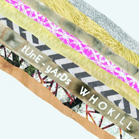Music Reviews, 04/2011
by James Brubaker
R.E.M.
Collapse Into Now
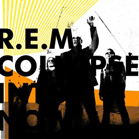 It’s been a rough thirteen years for the discerning R.E.M. fan. Since 1998’s Up (their first album after the departure of drummer Bill Berry in 1997) the band has been floundering. While that first post-Berry album had its share of great tunes and its follow up, 2001’s Reveal, had a few stand-outs, by 2004’s Around the Sun, R.E.M. seemed to be sputtering to a depressing stop on the highway of late-career success. 2007’s Accelerate found R.E.M. trying to reclaim the energy of their youth but ultimately, with one or two exceptions, the music sounded forced and the lyrics obvious, plain, and didactic. As a long time fan of R.E.M.—they’ve been my favorite band since I became a serious fan of music around twenty years ago—it pains me to say that the 00’s are something of a lost decade for R.E.M.; the last album of theirs that I haven’t wiped from my hard drive is Up. Everything since then has been inessential at best.
It’s been a rough thirteen years for the discerning R.E.M. fan. Since 1998’s Up (their first album after the departure of drummer Bill Berry in 1997) the band has been floundering. While that first post-Berry album had its share of great tunes and its follow up, 2001’s Reveal, had a few stand-outs, by 2004’s Around the Sun, R.E.M. seemed to be sputtering to a depressing stop on the highway of late-career success. 2007’s Accelerate found R.E.M. trying to reclaim the energy of their youth but ultimately, with one or two exceptions, the music sounded forced and the lyrics obvious, plain, and didactic. As a long time fan of R.E.M.—they’ve been my favorite band since I became a serious fan of music around twenty years ago—it pains me to say that the 00’s are something of a lost decade for R.E.M.; the last album of theirs that I haven’t wiped from my hard drive is Up. Everything since then has been inessential at best.
So what is it about R.E.M.’s latest, Collapse Into Now, that makes it, while not exactly a great album, at least a surprisingly pleasant one? The most obvious answer can be found in the already oft-cited sense that this new album finds R.E.M. relaxing and just letting themselves be R.E.M. Perhaps after a decade of flops, R.E.M. have arrived at a place where they don’t feel any pressure to compete with themselves or be important (read: writing trite, bored political songs) and the result is, more often than not, a fun, pleasant pop album. In spirit, Collapse Into Now feels most similar to the band’s Green and Out of Time albums, blending chamber pop with upbeat rockers and a few arena ready jams. While nothing on the new album stands toe to toe with classic songs from those albums, a few tracks are certainly worthy of the R.E.M. tradition. Album-opener “Discoverer,” is a soaring anthem that sets the bar high for the rest of the album. Unfortunately, the bar is immediately brought crashing back down to Earth by the generic, “All the Best,” which sounds as if it could have been an Accelerate outtake. Elsewhere, “Überlin,” is pleasant, if a bit dry, R.E.M. flavored acoustic pop; “Oh My Heart,” is a heavy sequel to Accelerate standout “Houston”; and album-closer “Blue” is a messy “E-Bow The Letter” knockoff (complete with Patti Smith guest-spot), that almost works but never quite takes hold. While these songs feel familiar and offer some pleasant arrangements and melodies, Collapse into Now succeeds most triumphantly when digging into the sun-drenched, retro-pop that makes Out of Time such an endearing, time-tested album.
An example: “It Happened Today,” might seem a bit silly, but so does “Shiny Happy People.” Here, Stipe’s vocals sound more assured than they have for a decade, and Mike Mill’s (and Eddie Vedder’s) backing harmonies give the song an extra shot of energy that make it one of the best the band has recorded in a long, long time. “Mine Smell Like Honey,” falls into similar sonic territory, though it’s chorus and production could stand to be sharper (someone needs to tell R.E.M. that Jacknife Lee is not doing them any favors). Perhaps the most surprising and exciting song on Collapse into Now, though, is the vintage pop pastiche of “Walk it Back,” which invokes sixties pop and hints of blue-eyed soul. The song provides Stipe with plenty of opportunity to let his voice shine, while the production—for once—provides enough space for the arrangement to take root and invite listeners in.
Collapse into Now is not a great album, especially by R.E.M.’s standards (I haven’t even touched on trainwrecks like “Everyday is Yours to Win,” and “Alligator_Aviator_Autopilot_Antimatter”) but it provides more justification for R.E.M.’s continued existence than all of their 00’s output combined. Of course, the real test will be whether or not, six months from now, the album is still hanging out on my iPod. It’s still too soon to call, but I suspect it will be.
Kurt Vile
Smoke Ring for My Halo
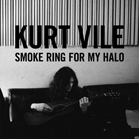 I don’t know why, but for some reason Kurt Vile’s recorded output up until this year has sounded about as exciting to me as chain restaurant pizza. There’s been a certain classic element to Vile’s songs, but everything has always sounded a little too classic. That is to say, until his recent album Smoke Ring for My Halo, Vile’s songwriting was admirable but the overall sound and style felt utterly tired and even a little bit lazy.
I don’t know why, but for some reason Kurt Vile’s recorded output up until this year has sounded about as exciting to me as chain restaurant pizza. There’s been a certain classic element to Vile’s songs, but everything has always sounded a little too classic. That is to say, until his recent album Smoke Ring for My Halo, Vile’s songwriting was admirable but the overall sound and style felt utterly tired and even a little bit lazy.
So what happened on Smoke Ring for My Halo? To be honest, I’m not entirely sure. This is, in part, because I’ve paid so little attention to Vile’s previous output, but also because some of the change seems as if it is rooted in something a bit more intangible. Perhaps the most notable difference between Vile’s latest and at least some of his earlier work is a surprising clarity and focus to the album’s overall sound. On initial listens, Smoke Ring for My Halo feels hazy and undefined, a lazy daydream of a record full of unlikely hooks and rich, though ill-defined textures. With repeat listens, however, Vile’s latest reveals itself to be a gorgeous, meticulously produced album that puts as much stock in clearly defined layers of sound as Vile puts into his lazy-sounding vocal delivery. And there’s that word again—lazy. Truthfully, there is nothing lazy about Smoke Ring for My Halo—the word fits the album’s atmosphere, but nothing else. The delicate guitar lines, layers of reverb, and the unfuckwithable melody that opens the album on “Baby’s Arms,” is a testament to just how not-lazy Vile’s new record is. And maybe that’s what sets Vile’s latest apart from his previous work—not only are the songs brilliantly produced but each one has its own atmosphere and its own array of unlikely sing-along moments. Vile even keeps oddly ham-fisted “political” songs like “Society is My Friend,” and “Puppet to the Man,” from getting too heavy or preachy—the singer’s tongue remains planted firmly in cheek and the focus stays on the songs’ atmospheres as opposed to any sort of “message.”
Even though Smoke Ring for My Halo has become one of my most listened to albums of the year, I’m still at something of a loss to describe what makes it so special. Certainly the production plays a big part, and the unexpectedly catchy choruses, but if I had to double-down and take a shot at what makes the album work, I’d have to point to its atmosphere. The album feels sun-bleached and exhausted but hopeful, stoned but articulate, heavy but full of an unlikely lightness of spirit. More than that though, the album just feels right.
Dirty Beaches
Badlands
 Months before Badlands was released, much of the narrative surrounding the album’s critical reception had already been set. Early reviews and features about Dirty Beaches focused on the project’s 50’s vibe and lo-fi production. There were plenty of comparisons to Suicide, and even a few to David Lynch films. To be honest—I can’t top any of those comparisons. What Dirty Beaches has done, though, with Badlands is make a record in which the core sound of its songs wouldn’t seem out of place in a fifties pop and rock-a-billy scene if it weren’t for the scuzzed out production and general seediness that runs through the album.
Months before Badlands was released, much of the narrative surrounding the album’s critical reception had already been set. Early reviews and features about Dirty Beaches focused on the project’s 50’s vibe and lo-fi production. There were plenty of comparisons to Suicide, and even a few to David Lynch films. To be honest—I can’t top any of those comparisons. What Dirty Beaches has done, though, with Badlands is make a record in which the core sound of its songs wouldn’t seem out of place in a fifties pop and rock-a-billy scene if it weren’t for the scuzzed out production and general seediness that runs through the album.
Album opener “Speedway King,” feels closest in spirit to something Suicide might have penned thanks to its clanging loops and choked, trip-a-billy vocals. “Sweet Seventeen” amps up the seediness even more thanks to the lecherous title and refrain, which is set against a backdrop that might be the the best highway driving song you’ve never heard—after the tape has been sitting in the car all summer. But that’s what makes Badlands such an exciting record—it sounds oddly American—yes, it is rooted in the country’s musical traditions, but is just as interested in the decay that has—for better or worse—overtaken the familiar. In that regard, Badlands isn’t just a scuzzed-out road record, it’s an album about memory and sound, about people and beauty and the distance between the two, about a particular nostalgic conception of romance that we can never, and should never return to.
The Weeknd
House of Balloons
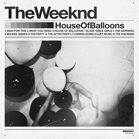 How is this for context—I don’t know who The Weeknd is, nor where they’re/he’s/it’s from, except that the act is affiliated with Canadian arts collective XO. And, truthfully, that’s pretty much all anybody knows. As it happens, House of Balloons, the act’s recently released mixtape offered for free download through its act’s website, is probably the single most compelling piece of evidence that the The Weeknd actually exist. And let’s all be glad that they do.
How is this for context—I don’t know who The Weeknd is, nor where they’re/he’s/it’s from, except that the act is affiliated with Canadian arts collective XO. And, truthfully, that’s pretty much all anybody knows. As it happens, House of Balloons, the act’s recently released mixtape offered for free download through its act’s website, is probably the single most compelling piece of evidence that the The Weeknd actually exist. And let’s all be glad that they do.
What we get with House of Balloons is an exciting, haunting R&B album that sounds kind of like The-Dream if he were produced by Burial. Or better—the songs on House of Balloons kind of sound like what a How to Dress Well album might sound like if the songs were fully written and then recorded to sound good. By mentioning acts like Burial and How to Dress Well, my hope is to communicate the low-key, haunted vibe that permeate many of The Weeknd’s tracks—“What You Need,” is a sexy come-on set against ghost-breaths and vaguely ominous keyboards, while “The Morning” is both gorgeous and sad, finding The Weeknd throwing down some soulful, lamentations about money and zombies. As absurd as it may sound, the songs on House of Balloons are truly moving and always exciting. Even as The Weeknd’s smooth R&B croon drops street-tough rhetoric, the songs are packed with an impressive pathos. And, of course, the emotional depth of the songs is only heightened by the occasionally glitchy, dubstep inspired production—the stuttering beats, chrome synths, and distorted samples create a masterfully sorrowful atmosphere that doesn’t just “back up” the vocals, but provides them with a platform that launches them into the stratosphere.
It’s still too early to tell what these songs are, exactly, who they’re by, or what kind of context they fit into. Of course, that’s part of the fun when working with new music and we rarely get the opportunity to hear so much new music with so little context anymore. That being said, whatever House of Balloons ends up being in the long-term, for now, it’s an engaging and impressive collection of songs from a ________ at the top of _________ game.
tUnE-yArDs
W H O K I L L
I briefly contemplated making the above exclamation my entire review for tUnE-yArDs’ latest, W H O K I L L. Even now, as I’m setting out to try to capture the album’s sound in words I’m not sure I’m up to the task. W H O K I L L is the sort of album that resists, well, everything. In terms of genre, it’s damn-near indescribable. I can point out the passing aesthetic similarities between the album’s idiosyncratic, voice-heavy arrangements and The Dirty Projector’s vocal gymnastics on Bitte Orca, but the comparison would be reductive to say the least. Or I could talk about tUnE-yArDs’ idiosyncratic front-woman, Merril Garbus, and her playfully androgynous, utterly exuberant vocals but that, too, would only tell a tiny piece of the tUnE-yArDs story. Then there is the angle that explores the drastic growth in recording and arranging between 2009’s Bird-Brains, and W H O K I L L but that’s not really important to a discussion of the later. Alas, for maybe the first time in my days writing about music I feel as I’ve been confronted by an album that makes me feel in my bones what it means to try to dance about architecture.
So how can we really talk about W H O K I L L? Let’s say it’s odd, and funky, full of other-worldly vocals and nasty sax-skronk. The album is kind of like punk, but also kind of like post-punk, and there are definitely some hints of abstract-dream-funk happening, but what does that even mean? If I were pressed to come up with an appropriate set of descriptors for W H O K I L L, I would probably have to go outside of the musical lexicon and describe the overall sound with a hyphenated list: elastic-animal-riot-funk-plastic-pirate-face-boomerang.
Or, I could just go with my initial instinct: tUnE-yArDs—Fuck yeah!
Fleet Foxes
Helplessness Blues
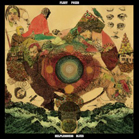 In the months leading up to the release of Fleet Foxes’ second LP, Helplessness Blues, the bands heavily-bearded lead singer, Robin Pecknold, took to Twitter, or Atease—one of those avenues through which he keeps in touch with his fans—to express concern about the sentimental nature of the album’s opening lyric. The lyric in question, reads: “So, now I am older than my mother and father/When they had their daughter/Now what does that say about me.” While Mr. Pecknold may have not been too far from the mark with his concern that such a lyric, taken out of context, might be a little trite, I can’t help but think that he wasn’t accounting for other factors—like how such a line is actually pretty heavy in the context of pop music, or that his delivery of the line might absolve it from any wrong-doing, or even that the lyric might just be the perfect opening to an album as richly textured, and intelligently introspective as Helplessness Blues actually is.
In the months leading up to the release of Fleet Foxes’ second LP, Helplessness Blues, the bands heavily-bearded lead singer, Robin Pecknold, took to Twitter, or Atease—one of those avenues through which he keeps in touch with his fans—to express concern about the sentimental nature of the album’s opening lyric. The lyric in question, reads: “So, now I am older than my mother and father/When they had their daughter/Now what does that say about me.” While Mr. Pecknold may have not been too far from the mark with his concern that such a lyric, taken out of context, might be a little trite, I can’t help but think that he wasn’t accounting for other factors—like how such a line is actually pretty heavy in the context of pop music, or that his delivery of the line might absolve it from any wrong-doing, or even that the lyric might just be the perfect opening to an album as richly textured, and intelligently introspective as Helplessness Blues actually is.
Before I go on, let’s talk about Fleet Foxes’ self-titled 2008 debut. It’s a great album, with some great songs and a sort of vague, timeless vibe to it. At the same time, Fleet Foxes has felt a bit impenetrable to me. As enjoyable as that album is, the sound is maybe a little too calculated, and the arrangements a little too self-conscious so that, while there isn’t a down moment on the entire set, the end result feels a little bit like a very professional, very talented indie rock band trying to play timeless, mountain-folk music. While Fleet Foxes talent hasn’t gone anywhere, and their vision is still singular, Helplessness Blues ups the ante to unprecedented degrees and puts Fleet Foxes on an entirely new plane of craft and scope.
So what is it, exactly, about Helplessness Blues that makes it such a large leap for the band? To begin with, the songwriting is bigger, and more assured. One of the album’s more pop-driven moments, “Lorelai” sways with a gentle lilt; the song is goaded on by a light swinging beat and delicate guitar figure that recalls Dylan’s “4th Time Around,” as Pecknold sings “So, guess I got old/I was like trash on the sidewalk,” as an introduction to a tale of love grown stale. The Foxes also show off their improved melodic chops on “The Plains / Bitter Dancer,” which finds the them immersed in their familiar vocal harmonies, but with a more dynamic melodic line, and a haunting arrangement that evokes a clearer, more specific sense of sonic space than anything on the first album. While both of these songs are impressive in their own rights, neither comes close to the album’s stunning title track, a rootsy, pastoral reflection on fear and inner-will, which in the song’s closing moments—softly surging like a baroque anthem—finds Pecknold singing, “If I had an orchard I’d work ‘till I’m sore.”
Perhaps the biggest surprises to be found on Helplessness Blues rest in a surprising rawness that occasionally creeps into Pecknolds’ vocal performance, most notably in the ways he stretches his voice and gets a bit loud—practically screaming by Pecknold standards—on “The Shrine / An Argument,” as he exclaims “Sunlight over me no matter what I do.” His delivery calls to mind mid-career Roger Daltrey in its intensity, but carries even more weight as it is used so sparingly. Even more surprising is Pecknold’s stripped-down performance on “Blue Spotted Tail,” one of the album’s flat-out show-stoppers. The song removes all of the harmonies, reverb, and layers of sound to expose the singer’s voice in its purest form. The song’s nuanced melody is outshined only by the raw sense of intimacy built into the performance, especially when Pecknold begins humming. I hesitate to make another comparison to another pop classic, but the song, in its approach, and its relationship to the rest of the album, plays like nothing if not McCartney’s “Blackbird,” situated in the sea of chaos that is The Beatles.
I feel like I’ve inadvertently made some big claims in this review. Comparisons to Dylan, The Who, and The Beatles are not to be taken lightly, but I think Fleet Foxes are up to the occasion. By allowing their sound to open up and get a little looser, they have managed to create an album that doesn’t just sound timeless, but might actually be timeless. Of course, I’ll qualify my thoughts with an “only time will tell,” but for now, Helplessness Blues is an album out of time. While that means it is out of step with the present—and it is, try listening to James Blake then Helplessness Blues—the album is so firmly rooted in the tradition of rock and pop music that it doesn’t even sound like pastiche or homage. Happiness Blues
is the rare contemporary album that looks to the past without getting misty-eyed with nostalgia or tripped up by superficial aesthetic concerns. While managing to sound distinctly like Fleet Foxes every step of the way, the band has crafted an album larger than their time.

